
Kubernetes has taken the world by storm, transforming how applications are developed, deployed, and maintained. For a time, managing stateful services with Kubernetes was difficult, but that has changed dramatically with recent innovations in the community. Building on that work, SingleStore is pleased to announce the availability of our SingleStore Kubernetes Operator, and our certification by Red Hat to run on the popular OpenShift container management platform.
Kubernetes has quickly become one of the top three most-loved platforms by developers. Now, with the SingleStore Kubernetes Operator, technology professionals have an easy way to deploy and manage an enterprise-grade operational database with just a few commands.
Note: The SingleStore Kubernetes operator is currently experimental, and in beta. It will reach general availability in the coming months.
The new beta Operator is certified by Red Hat to run SingleStore software on Red Hat OpenShift, or you can run it with any Kubernetes distribution you choose. Running SingleStore on Kubernetes gives data professionals the highest level of deployment flexibility across hybrid, multi-cloud, or on-premises environments. As Julio Tapia, director of the Cloud Platforms Partners Ecosystem for Red Hat, put it in our press release, services in a Kubernetes-native infrastructure “‘just work’ across any cloud where Kubernetes runs.”
As a cloud-native database, SingleStore is a natural fit for Kubernetes. SingleStore is a fully distributed database, deploys and scales instantly, and is configured quickly and easily using the native SingleStore API. SingleStore customers have requested the Kubernetes Operator, and several participated in testing prior to this release.
The majority of SingleStore customers today deploy SingleStore on one or more public cloud providers. Now, with the Kubernetes Operator, they can deploy on any public or private infrastructure more easily.

How to Use The SingleStore Kubernetes Operator
You use the SingleStore Kubernetes Operator like other standard Kubernetes tools. Use the Kubernetes command-line interface (CLI) and the Kubernetes API to interact with the Operator and manage the application. The task of managing the cluster is greatly simplified. DevOps and administration teams can also use the Operator to implement partial or full automation.
The Operator enables you to create, read, update, and delete SingleStore clusters. Among the options you specify (see here for details):
- The cluster size. Cluster size is defined in units, where one unit of cluster size is equal to one leaf node.
- The memory and CPU assigned. This is defined as height, where one unit of height equals 8 vCPUs and 32GB of RAM.
- The redundancy level. Level 1 is no redundancy, level 2 is one redundant copy (recommended for production use).
- The storage size. How much disk space you want to reserve.
Because Kubernetes is a declarative, rather than imperative, environment, you describe the state of the cluster that you want Kubernetes to create and maintain. Kubernetes then maintains that state for you. The commands and operations are the same across all the major public clouds, private clouds, and on-premises installations as well.
The minimum cluster size you should

specify is a single leaf unit with height 1, three aggregator units (automatically created, with height 0.5), and redundancy level 2. When you create the cluster, a DDL endpoint is returned to you. You connect to the cluster using the DDL endpoint.
The SingleStore Kubernetes Operator does not currently include the ability to split and merge partitions. You will need to perform this function manually, outside of Kubernetes. We expect to include partition management in a future release.
Next Steps
If you’re already a SingleStore customer, you can begin using the Kubernetes Operator today. Access it here.
If you are not already a customer, you’ll find SingleStore a great fit for a wide range of operational analytics use cases. Try SingleStore for free today or contact us to learn how we can help you.





